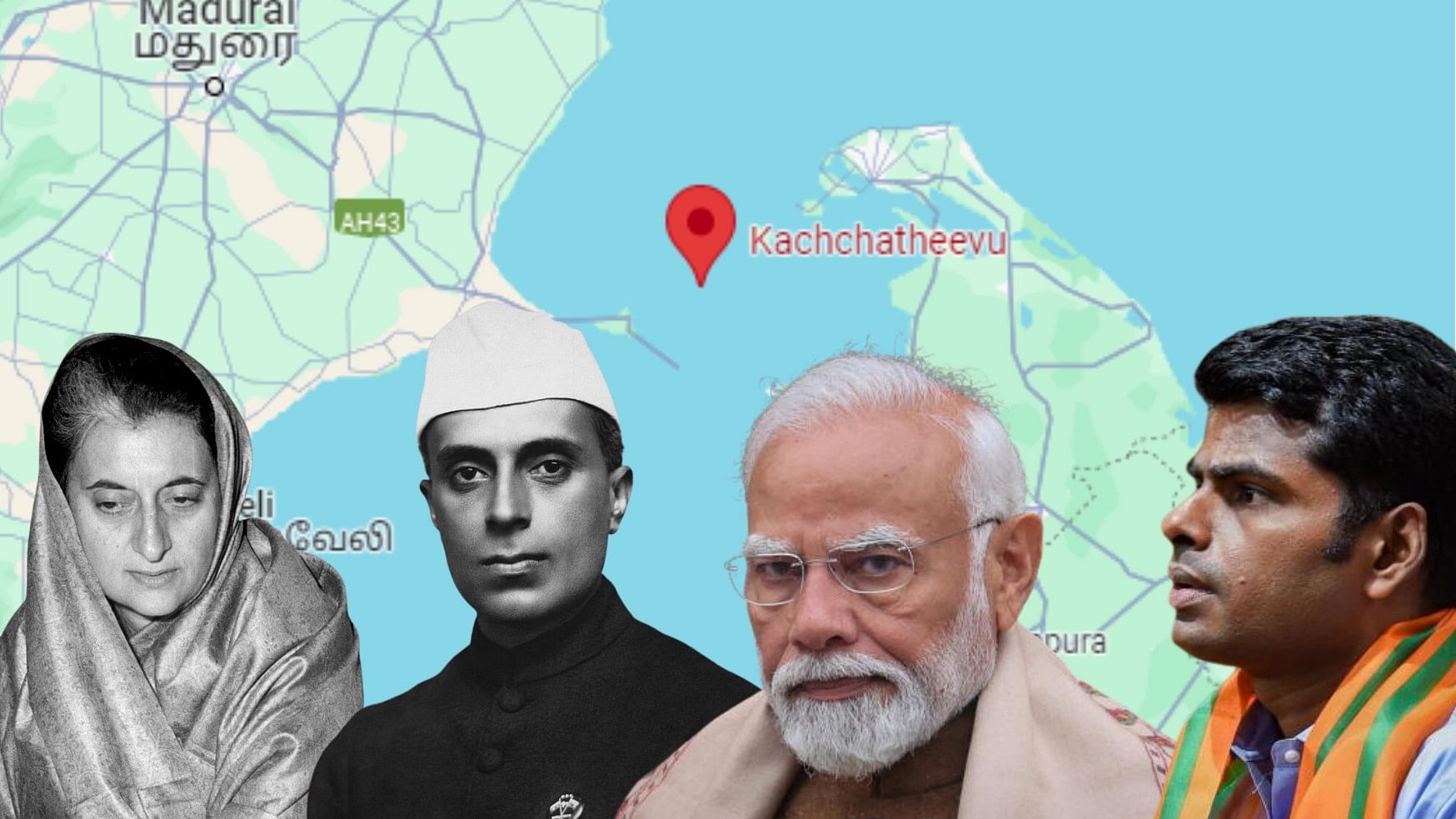
As part of her ‘Indo-Sri Lankan Maritime agreement’, with her counterpart Srimavo Bandaranaike, Indira Gandhi ceded Katchatheevu to Sri Lanka in 1974.
Credit: Google maps, Wikimedia Commons, PTI and Reuters
In the run up to the Lok Sabha polls, the saffron party has brought up a 5-decade-old contentious issue, the Katchatheevu island.
BJP's Tamil Nadu chief K Annamalai obtained some documents alleging that the Congress never gave much importance to the Katchatheevu Island and hence, "gave away" the tiny Island to Sri Lanka.
The details of the documents drew criticisms from the saffron party including the PM who said that the issue highlighted Dravida Munnetra Kazhagam's (DMK) "double standards".
The Katchatheevu issue had always been a bone of contention between late Chief Ministers M Karunanidhi and J Jayalalithaa as well.
Katchatheevu island: Where is it and how the contention began
An uninhabited island, Katchatheevu, was controlled by British Ceylon (now Sri Lanka) since 1921. The island remained a disputed territory until 1974 when it was ceded to Sri Lanka.
It lies northeast of Rameswaram, about 33 km from the Indian coast. It is about 62 km southwest of Jaffna, at the northern tip of Sri Lanka, and 24 km away from the inhabited Delft Island, belonging to Sri Lanka.
It was earlier owned by the Ramnad Kingdom of Ramanathapuram Rameshwaram which later came under the Madras Presidency during British rule of Indian subcontinent.
It was during 1920 when the contention over the claim of the territory began. Because it was owned by the Raja of Ramnad, Indians considered it a part of India. However, this view was opposed with the claim that Katchatheevu island along with the St. Anthony's Church on the island belonged to Jaffna Diocese (district under pastoral care).
Indo-Sri Lankan Maritime agreement 1974: Indira Gandhi's issue resolution
As part of her ‘Indo-Sri Lankan Maritime agreement’, with her counterpart Srimavo Bandaranaike, Indira Gandhi ceded Katchatheevu to Sri Lanka in 1974.
At the time, Gandhi thought the island had no strategic value and instead focused on her relations with the neighbour country.
Protests against this move, citing the historical control of the Ramnad zamindari over the island and traditional fishing rights of Indian Tamil fishermen, erupted in the state, Indian Express reported.
The agreement did not specify the fishermen's right to access the territory. While India interpreted it as allowance, Sri Lanka interpreted the allowance to be limited to "rest, drying nets and for visit to the Catholic shrine without visa", IE reported.
Fishermen's rights in the territory were again wrapped under confusion during the period of Emergency in India (1976) when an agreement barred either country from fishing in the other’s Exclusive Economic Zone.
Island's importance for Tamil Nadu
Indian fishermen who go into the area and get detained for 'poaching' are mostly from Tamil Nadu.
The DMK, in 1974 protested against Indira's move and claimed the Congress government had not factored in its views before signing the agreement with Sri Lanka, according to reports.
J Jayalalithaa during her term, continuously flagged the issue and even went to Supreme Court over it.
M Karunanidhi too, in 2006, made an appeal to the then PM, for the retrieval of Katchatheevu in order to create "congenial conditions for Tamil Nadu fishermen to lead a peaceful life", IE report noted.
Ahead of Sri Lankan Prime Minister Ranil Wickremesinghe's visit last year, Tamil Nadu Chief Minister M K Stalin wrote to PM Narendra Modi requesting him to discuss the plight of fishermen.
The issue resurfaced at a time when the I.N.D.I.A. bloc organised 'Loktantra Bachao' (Save Democracy) rally slamming the arrest of Delhi CM Arvind Kejriwal.
As the national elections near, the political dynamics of the nation has been shifting with the disclosure of electoral bonds, ED raids on opposition leaders, I-T department's rising tax demands on the Congress, the arrest of Kejriwal and now the rebirth of decades old issue.